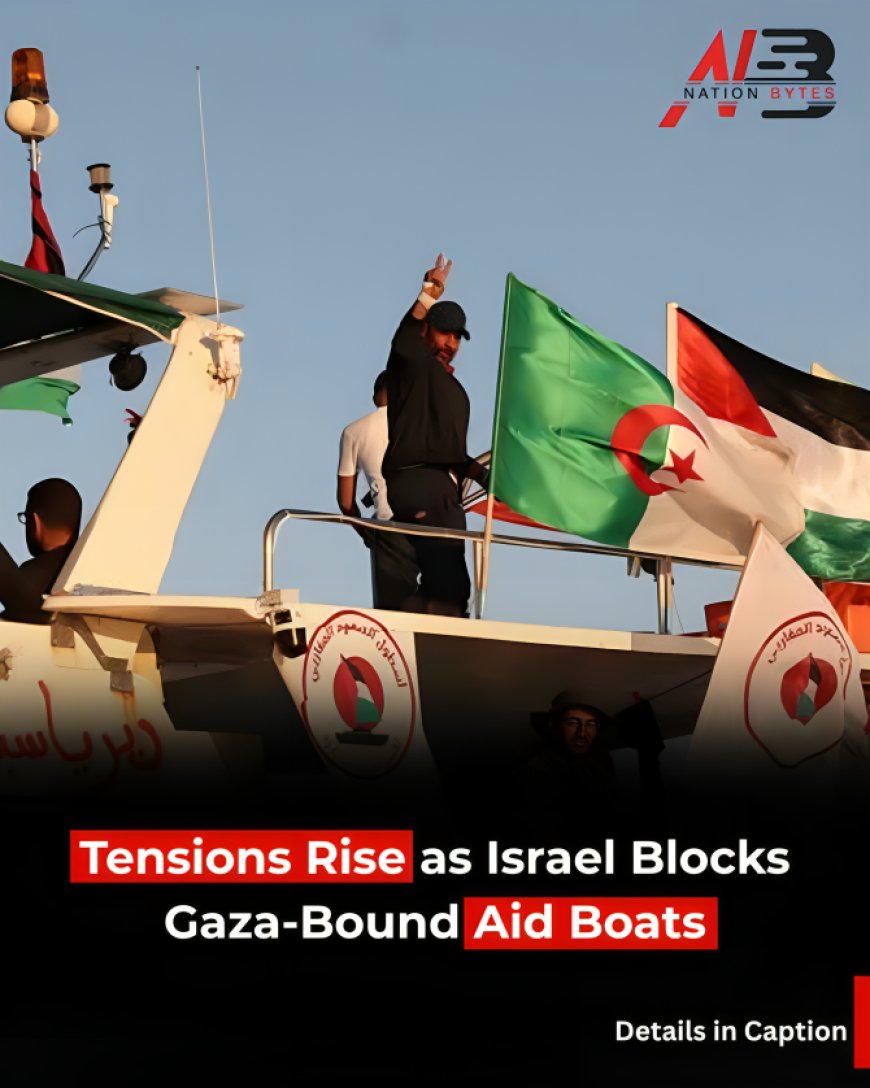Tensions Rise as Israel Blocks Gaza-Bound Aid Boats
Israel intercepted a Gaza-bound flotilla carrying humanitarian aid and activists, including Greta Thunberg. Over 150 activists from 20+ countries were detained as protests erupt worldwide.

In a dramatic escalation of tensions, Israeli naval forces intercepted a flotilla of humanitarian aid boats bound for Gaza early Thursday morning, detaining more than 150 international activists, including high-profile Swedish climate campaigner Greta Thunberg. The interception of the Global Sumud Flotilla has sparked global outrage, protests across multiple countries, and renewed debate over Israel’s longstanding blockade of the Gaza Strip.
The Mission and Interception
The flotilla, consisting of around 39 aid boats from more than 20 countries, set sail across the Mediterranean Sea with the declared mission of breaking Israel’s blockade and delivering food, medical supplies, and clean water filters to Gaza, where parts of the enclave are facing famine-like conditions.
According to flotilla organizers, Israeli forces intercepted more than a dozen boats approximately 46 nautical miles off Gaza’s coast, in what they described as an illegal operation in international waters. Videos shared online showed water cannons targeting smaller boats and commandos boarding vessels.
The Israeli Foreign Ministry later confirmed that several boats had been redirected to Israeli ports, where activists were detained for questioning before deportation. The ministry dismissed the mission as a “public relations stunt” orchestrated by pro-Palestinian groups.
Greta Thunberg Among the Detained
Among those on board was Greta Thunberg, whose calm exchange with Israeli personnel in military gear was captured in widely shared video footage. Thunberg has been outspoken about humanitarian issues and recently joined campaigns highlighting the crisis in Gaza, where more than 2.2 million Palestinians remain under blockade.
Flotilla organizers confirmed that Thunberg, along with activists from Italy, Spain, Greece, Turkey, Malaysia, and Brazil, was detained and transferred to an Israeli port. Malaysia’s Prime Minister Anwar Ibrahim strongly condemned the interception, demanding the immediate release of the eight Malaysians detained.
Humanitarian Goals or Political Stunt?
The flotilla’s mission, known as the Global Sumud Flotilla, had been public for weeks. Organizers livestreamed their journey, documented training for nonviolent resistance, and invited international lawmakers, human rights defenders, and high-profile figures to join.
Activists insisted that their boats carried only humanitarian goods, including food, medicine, and water filters, rejecting Israeli claims that the mission was tied to Hamas.
Israeli officials, however, maintained that no vessel would be allowed to reach Gaza directly, citing security concerns. They offered to deliver the aid through Israeli ports, a proposal flotilla members rejected as disingenuous.
International Reactions and Protests
News of the interceptions triggered protests across Europe, particularly in Italy, where anti-war demonstrations disrupted traffic and public activity. In Spain, France, Belgium, Germany, Greece, and Turkey, thousands marched in solidarity with the flotilla, demanding humanitarian access to Gaza.
The Italian and Greek foreign ministries had earlier urged organizers to offload their cargo with the Latin Patriarchate of Jerusalem, citing fears of jeopardizing a new U.S.-backed peace initiative. Spain also warned that entering the “closed military zone” would endanger activists’ lives.
Despite those warnings, flotilla leaders insisted on sailing directly to Gaza, describing their mission as a moral obligation amid growing reports of famine in the enclave.
A History of Deadly Confrontations
This is not the first time Israel has intercepted Gaza-bound aid flotillas. The most infamous incident occurred in 2010, when Israeli commandos stormed the Turkish vessel Mavi Marmara, killing nine activists and sparking an international outcry.
More recently, in May 2025, a Gaza-bound ship named Conscience was damaged in an explosion near Malta, while other vessels, including the Madleen and Handala, were intercepted earlier this year.
The Global Sumud Flotilla reported experiencing drone attacks during its voyage, including near Greece and Tunisia, which they blamed on Israel. However, Israeli officials have not publicly addressed those accusations.
Gaza’s Humanitarian Catastrophe
The interception comes amid one of the worst humanitarian crises in Gaza’s history. According to a U.N.-backed panel of food experts, parts of Gaza are experiencing famine conditions, with widespread malnutrition and hunger.
From March to May 2025, Israel reportedly blocked all aid convoys into Gaza, arguing that Hamas was looting supplies. Humanitarian groups, however, have accused Israel of weaponizing food and essential goods in its war strategy.
A U.N. commission recently accused Israel of committing genocide against Palestinians in Gaza, citing indiscriminate attacks and the deliberate denial of aid. Israel rejected the report as biased and politically motivated.
Calls for Accountability
Flotilla organizers have vowed to pursue legal action against Israel for what they termed an illegal attack in international waters. International human rights groups, including Amnesty International and Human Rights Watch, have demanded the immediate release of detainees and unhindered access for humanitarian aid.
Meanwhile, governments in Turkey, Malaysia, and Spain have called emergency meetings to discuss diplomatic responses, while grassroots protests are expected to intensify in the coming days.
What Comes Next?
Despite the interception, about 30 more boats remain en route to Gaza, raising fears of further confrontations at sea. Activists have pledged to continue their mission until aid reaches civilians in Gaza, while Israel has reiterated that it will “use all necessary measures” to prevent any breaches of its blockade.
The flotilla crisis has not only reignited debates about Israel’s blockade and humanitarian responsibility but also put renewed global spotlight on the voices of young activists like Greta Thunberg, who are increasingly linking climate, justice, and human rights movements together.
The interception of the Global Sumud Flotilla marks yet another flashpoint in the long-standing Gaza blockade and highlights the growing divide between Israel and the international community. With worldwide protests, diplomatic condemnations, and more aid boats on the horizon, the situation remains tense.

 Ateeq Ur Rehman
Ateeq Ur Rehman